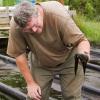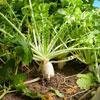Research Labs
The Department of Environmental Science and Technology is developing into a world-class center of discovery and teaching that will innovate and educate to deal with increasingly complex environmental conditions.
The Department serves the campus community as a key, foundational unit of its increasingly broader emphasis on the environment. It is unique among campus units because it is comprised of a critical mass of faculty fully involved in environmental science and problem solving. Explore our labs and research centers to learn more about the faculty and graduate student research across a spectrum of environmental fields:
| Name | Coordinator |
|---|---|
| Applied Spatial Wildlife Ecology Lab Human, animal and environmental interactions | Dr. Jennifer Mullinax |
| Aquatic Toxicology Lab Ecotoxicology | Dr. Lance Yonkos |
| Bioenergy and Bioprocessing Technology Lab Waste to Energy | Dr. Stephanie Lansing |
| Contaminant Research Lab Human influences on water-soil and soil-plant chemistry | Dr. Candice Duncan |
| Ecology and Health Lab | Dr. Paul Leisnham |
| Ecosystem Engineering Design Lab | Dr. David Tilley |
| Hydrology and Water Resources Engineering Lab | Dr. Adel Shirmohammadi |
| Joint Analytical Services Lab | Dr. William Bowerman |
| Microbial Ecology and Biogeochemistry Lab | Dr. Stephanie Yarwood |
| Pedology Research Lab | Dr. Martin Rabenhorst |
| Physiology and Genetics Lab Plant growth and development | Dr. Wendy Peer |
| Soil Chemical Interfaces (W-SCI) Lab Soil systems and cycles within the Earth’s climate | Dr. Jared Wilmoth |
| Soil Quality Lab Physical, chemical and biological aspects of soil quality | Dr. Ray Weil |
| Soil and Water Geospatial Analysis Lab | Dr. Brian Needelman |
| Urban X Nature Lab Urban environment effects on species populations and behaviors | Dr. Travis Gallo |
| Wetland Ecology and Engineering Lab | Dr. Andrew Baldwin |
Research Centers
 |
CENTER FOR ALGAL ECOTECHNOLOGY The Algal Ecotechnology Center (AEC) is an organizational unit for advancing the design and implementation of ecologically-engineered, algal-based technologies for water quality management and economic development. |
 |
Under a grant from Northeast SARE, a team of research scientists, extension agents and farmers from Maryland, Pennsylvania, and New Jersey are working to develop new systems of no-herbicide no-till planting of early vegetables into a seedbed prepared by low-residue winter-killed cover crops such as forage radish. |